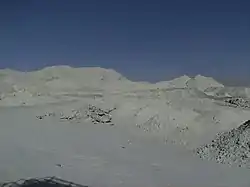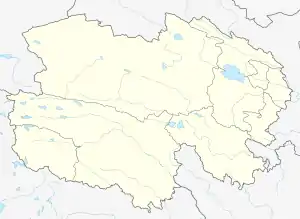Mangnai
Mangnai, also known as Mang'ai or Mangya, is a county-level city in the northwest of Qinghai Province, China, bordering Xinjiang to the north and west. It is under the administration of Haixi Mongol and Tibetan Autonomous Prefecture. It is one of the most remote cities in China, the closest other city, Ruoqiang, is located 350 kilometres (220 mi) away.[3] In 2018 it had a population of 63,000.[4] The name Mangnai is based on the Mongolian word for 'forehead'.[5]
Mangnai
茫崖市 · ᠮᠠᠨᠭᠨᠠᠢ ᠶᠢᠨ ᠬᠣᠲᠠ · མང་ནེ་གྲོང་ཁྱེར། Mang'ai, Mangya | |
|---|---|
 Surroundings of the asbestos mines. | |
.png.webp) Mangnai (light red) within Haixi Prefecture (yellow) and Qinghai. | |
 Mangnai | |
| Coordinates: 38°15′00″N 90°51′25″E | |
| Country | China |
| Province | Qinghai |
| Autonomous prefecture | Haixi |
| Seat | Huatugou |
| Area | |
| • Total | 49,900 km2 (19,300 sq mi) |
| Elevation | 3,000 m (10,000 ft) |
| Population (2020)[1] | |
| • Total | 18,856 |
| • Density | 0.38/km2 (0.98/sq mi) |
| Time zone | UTC+8 (China Standard) |
| Website | www |
| Mangnai | |||||||
|---|---|---|---|---|---|---|---|
| Chinese name | |||||||
| Chinese | 茫崖市 | ||||||
| |||||||
| Tibetan name | |||||||
| Tibetan | མང་ནེ་གྲོང་ཁྱེར། | ||||||
| |||||||
| Mongolian name | |||||||
| Mongolian script | ᠮᠠᠨᠭᠨᠠᠢ ᠶᠢᠨ ᠬᠣᠲᠠ | ||||||
| |||||||
It was formed in 2018 when the Mangnai and Lenghu administrative zones merged to establish the county-level city of Mangnai.[5]
Economy
Mangnai had a large asbestos mine, it was the largest in China, it also holds around half of China's serpentine reserves.[6][7][8] It also produces oil, natural gas, celestite, and sodium sulfate.[5]
Administrative divisions
Mangnai is divided into 3 towns. The administrative center is the Huatugou Town.[5]
| Name | Simplified Chinese | Hanyu Pinyin | Tibetan | Wylie | Mongolian (traditional script) | Mongolian (Cyrillic) | Administrative division code |
|---|---|---|---|---|---|---|---|
| Towns | |||||||
| Huatugou Town | 花土沟镇 | Huātǔgōu Zhèn | ཧྭ་ཐུའུ་ཀུའུ་གྲོང་རྡལ། | hwa thu'u ku'u grong rdal | ᠡᠩᠭᠡᠷᠲᠦ ᠪᠠᠯᠭᠠᠰᠤᠨ | Энгэрт балгас | 632803100 |
| Mangnai Town | 茫崖镇 | Mángyá Zhèn | མང་ནེ་གྲོང་རྡལ། | mang ne grong rdal | ᠮᠠᠩᠨᠠᠢ ᠪᠠᠯᠭᠠᠰᠤᠨ | Магнай балгас | 632803101 |
| Lenghu Town | 冷湖镇 | Lěnghú Zhèn | ལེན་ཧུའུ་གྲོང་རྡལ། | len hu'u grong rdal | ᠬᠦᠢᠲᠡᠨ ᠨᠠᠭᠤᠷ ᠪᠠᠯᠭᠠᠰᠤᠨ | Хүйтэн нуур балгас | 632803102 |
Demographics
17 different ethnic groups live in the city, including the Han Chinese, Mongols, Tibetans, the Hui, Salars, Monguors, Manchus, Dongxiangs, and Uighurs.[4]
Climate
| Climate data for Mangnai (1991–2020 normals) | |||||||||||||
|---|---|---|---|---|---|---|---|---|---|---|---|---|---|
| Month | Jan | Feb | Mar | Apr | May | Jun | Jul | Aug | Sep | Oct | Nov | Dec | Year |
| Average high °C (°F) | −3.2 (26.2) |
2.2 (36.0) |
8.1 (46.6) |
14.0 (57.2) |
17.9 (64.2) |
21.6 (70.9) |
24.1 (75.4) |
23.8 (74.8) |
19.1 (66.4) |
11.9 (53.4) |
4.2 (39.6) |
−2.3 (27.9) |
11.8 (53.2) |
| Daily mean °C (°F) | −10.7 (12.7) |
−5.8 (21.6) |
0.1 (32.2) |
6.0 (42.8) |
10.5 (50.9) |
14.7 (58.5) |
17.1 (62.8) |
16.5 (61.7) |
11.6 (52.9) |
3.9 (39.0) |
−3.7 (25.3) |
−9.6 (14.7) |
4.2 (39.6) |
| Average low °C (°F) | −17.4 (0.7) |
−13.1 (8.4) |
−7.5 (18.5) |
−1.8 (28.8) |
3.2 (37.8) |
8.0 (46.4) |
10.8 (51.4) |
9.9 (49.8) |
4.7 (40.5) |
−3.4 (25.9) |
−10.6 (12.9) |
−16.0 (3.2) |
−2.8 (27.0) |
| Average precipitation mm (inches) | 0.8 (0.03) |
0.6 (0.02) |
0.8 (0.03) |
1.5 (0.06) |
6.1 (0.24) |
11.5 (0.45) |
13.6 (0.54) |
7.8 (0.31) |
4.5 (0.18) |
0.8 (0.03) |
0.1 (0.00) |
0.3 (0.01) |
48.4 (1.9) |
| Average precipitation days (≥ 0.1 mm) | 0.9 | 0.8 | 1.0 | 1.4 | 3.0 | 5.9 | 7.3 | 4.1 | 1.7 | 0.9 | 0.4 | 0.5 | 27.9 |
| Average snowy days | 1.6 | 1.5 | 2.0 | 2.3 | 1.8 | 0.2 | 0 | 0 | 0.1 | 1.2 | 0.6 | 1.3 | 12.6 |
| Average relative humidity (%) | 36 | 28 | 24 | 23 | 26 | 32 | 36 | 32 | 30 | 28 | 30 | 37 | 30 |
| Mean monthly sunshine hours | 227.3 | 224.8 | 263.2 | 275.2 | 285.9 | 261.4 | 263.9 | 270.2 | 270.0 | 282.3 | 239.7 | 223.5 | 3,087.4 |
| Percent possible sunshine | 74 | 73 | 70 | 69 | 64 | 59 | 59 | 65 | 74 | 83 | 80 | 76 | 71 |
| Source: China Meteorological Administration[9][10] | |||||||||||||
Tourism
The main touristic sites in Mangnai are:[5]
- Emerald Lake (Chinese: 翡翠湖)
- Qianfo cliffs (Chinese: 千佛崖; lit. 'thousand Buddha cliffs')
- Gasi Lake (Chinese: 尕斯湖)
- Yingxiongling Danxia Landform (Chinese: 丹霞地貌英雄岭)
- Alar Wetland (Chinese: 阿拉尔湿地)
- Yardang landform (Chinese: 雅丹地貌)
In 2019, a camp meant to simulate conditions on the planet Mars opened in the town of Lenghu, which is primarily geared towards tourists.[11]
Transport
Mangnai is located strategically on one of the main transport corridors between Gansu and Xinjiang. The Haixi Huatugou Airport serves Mangnai and the city is served by the Golmud–Korla railway and is located along China National Highway 315.[3]
Notes
- In Central Plains Mandarin it is pronounced Mang-ngai, a transcription of Oirat Mongolian Mangnai. In Standard Mandarin, ngai develops into two different readings with ya the most common one and ai used almost exclusively here. There's a tendency to pronounce it as ya in this situation as well.
References
- "海西州第七次全国人口普查公报(第二号)——各市县、行委常住人口情况" (in Chinese). Government of Haixi Prefecture. 2021-07-02.
- "Mangya government". Archived from the original on 2021-05-27. Retrieved 2021-07-27.
- "最"寂寞"的城市,成立仅3年人口不到7万,就在我国西部".
- 茫崖市人口数据 [Mangnai Population Data]. www.hongheiku.com (in Chinese). 2021-08-22. Archived from the original on 2021-10-19. Retrieved 2021-10-19.
- 茫崖市简介 [Mangnai Overview]. www.mangya.gov.cn (in Chinese). Mangnai Municipal People's Government. 2019-02-28. Archived from the original on 2021-05-27. Retrieved 2021-10-19.
- New China Quarterly. New China News Limited. 1987.
- Mineral Deposits of China. Geological Publishing House. 1990. ISBN 978-7-116-02077-1.
- Wu, Lan’er (2021). Comprehensive Utilization of Magnesium Slag by Pidgeon Process. Springer Nature. ISBN 978-981-16-2171-0.
- 中国气象数据网 – WeatherBk Data (in Simplified Chinese). China Meteorological Administration. Retrieved 27 September 2023.
- 中国气象数据网 (in Simplified Chinese). China Meteorological Administration. Retrieved 27 September 2023.
- Chen, Laurie (2019-03-04). "China opens 'Mars camp' for tourists, plans to send rover to red planet". South China Morning Post. Archived from the original on 2021-10-19. Retrieved 2021-10-19.